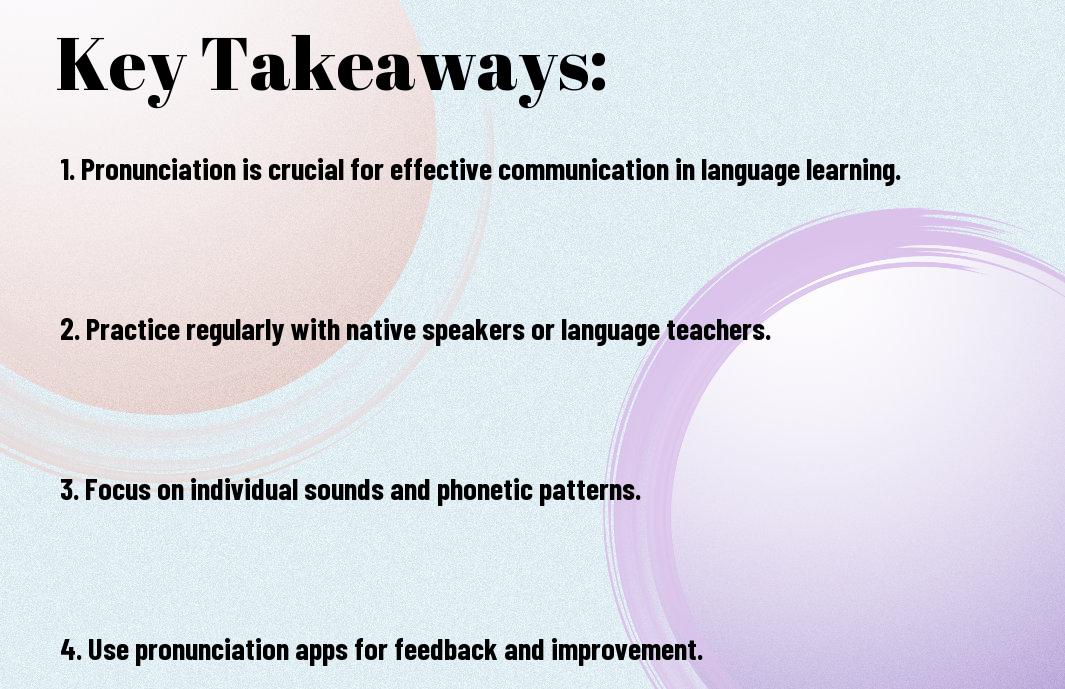There’s a pivotal factor in language learning that often gets overlooked but plays a crucial role in communication – pronunciation. Your ability to pronounce words correctly can significantly impact your overall language fluency and understanding. In this blog post, we will research into why pronunciation is crucial in language learning and explore some of the best strategies to enhance your pronunciation skills. By implementing these tips, you can boost your confidence and improve your communication effectiveness in any language you are learning.
Key Takeaways:
- Pronunciation is crucial in language learning: Proper pronunciation helps in clear communication and understanding in a second language.
- Practice regularly: Consistent practice is key to improving pronunciation, whether through language immersion, audio resources, or working with a language tutor.
- Focus on individual sounds: Pay attention to specific phonemes and practice their pronunciation to refine your overall language skills.

The Significance of Pronunciation in Language Learning
Why Pronunciation Matters
Significance is placed on pronunciation in language learning because it is crucial for effective communication. Proper pronunciation not only enhances your language skills but also makes it easier for native speakers to understand you. When you speak with accurate pronunciation, you convey your message clearly and confidently, which can lead to more meaningful interactions and connections with others.
The Impact of Poor Pronunciation on Communication
The impact of poor pronunciation on communication cannot be underestimated. When your pronunciation is off, it can lead to misunderstandings and confusion. It may hinder your ability to express yourself effectively and might even affect your confidence in using the language. Incorrect pronunciation can also create barriers in your communication with native speakers, making it harder for them to comprehend your message.
Another consequence of poor pronunciation is that it may affect how you are perceived by others. Native speakers may find it challenging to take you seriously or may assume that you are less proficient in the language if your pronunciation is not accurate. This could potentially limit your opportunities for advancement in your language learning journey.

Common Challenges in Mastering Pronunciation
Some language learners may encounter various challenges when it comes to mastering pronunciation. These obstacles can hinder your progress and make it difficult to communicate effectively in a target language. Understanding and addressing these challenges will help you improve your pronunciation skills and build confidence in your language learning journey.
Phonological Differences Between Languages
Common challenges in mastering pronunciation stem from the phonological differences between your native language and the language you are learning. Sounds that exist in one language may not exist in another, making it challenging to produce these new sounds accurately. For example, the pronunciation of tones in tonal languages like Mandarin Chinese or the guttural sounds in Arabic can be particularly challenging for learners whose native language lacks similar sounds.
Individual Speech Patterns and Habits
Pronunciation difficulties can also arise from individual speech patterns and habits that you have developed in your native language. Your brain may subconsciously try to apply the pronunciation rules of your first language to the new language you are learning, leading to inaccuracies. Overcoming these habits requires conscious effort and practice to retrain your mouth and ears to recognize and produce new sounds accurately.
Another aspect that can affect your pronunciation is your comfort level with making mistakes. Fear of embarrassment and self-consciousness can hinder your willingness to practice speaking out loud and experiment with new sounds. Embracing a growth mindset and understanding that making mistakes is a natural part of the language learning process can help you overcome this barrier.
Fear of Embarrassment and Self-Consciousness
Individuals may feel self-conscious about their pronunciation, worrying about being judged or laughed at by others. This fear of making mistakes can lead to a reluctance to practice speaking and a lack of confidence in your language skills. Remember that everyone makes pronunciation errors when learning a new language, and embracing these mistakes as opportunities for growth can help you progress more effectively.
Plus, seeking feedback from teachers, language partners, or language learning communities can provide valuable insights and encouragement to help you improve your pronunciation skills with confidence.
Effective Strategies for Improving Pronunciation
Listen and Imitate: The Power of Audio Models
On your journey to improving pronunciation, listening to native speakers and imitating their speech patterns is a powerful way to enhance your own pronunciation skills. Audio models provide you with a clear example of how words should sound, helping you grasp the nuances of pronunciation that may not be evident from written materials alone. By actively listening and mimicking these models, you can train your ear to recognize subtle differences in sounds and improve your own articulation.
Practice with a Language Exchange Partner or Tutor
Models to further enhance your pronunciation skills, practicing with a language exchange partner or tutor can provide invaluable feedback and guidance. Engaging in conversations with native speakers allows you to practice real-life scenarios and receive immediate corrections on your pronunciation. This interactive approach not only helps you refine your pronunciation but also boosts your confidence in speaking the language fluently.
Understanding the importance of regular practice, working with a language exchange partner or tutor can offer personalized support and insights into your specific pronunciation challenges. Through consistent practice and feedback, you can target areas for improvement and make noticeable progress in perfecting your pronunciation.
Record Yourself: Identifying Areas for Improvement
Effective pronunciation requires self-awareness and the ability to identify areas that need improvement. Recording yourself speaking in the target language allows you to listen back and pinpoint areas where your pronunciation may fall short. By comparing your recordings to native speakers or language resources, you can recognize patterns of mispronunciation and focus your efforts on refining those specific sounds or intonations.
Audio feedback from self-recordings can provide valuable insights into your progress and help you track improvements in your pronunciation over time. Utilize this self-assessment tool regularly to fine-tune your pronunciation skills and tailor your practice sessions for maximum impact.
The Role of Technology in Pronunciation Practice
Once again, technology proves to be a valuable tool in language learning, especially when it comes to improving pronunciation. With a variety of apps, online resources, and speech recognition software available, you have many options to enhance your pronunciation skills effectively.
Language Learning Apps with Pronunciation Features
On your language learning journey, consider utilizing apps that offer pronunciation features. These apps often incorporate voice recognition technology to provide feedback on your pronunciation accuracy. They may also include interactive exercises and drills specifically designed to help you improve your speaking skills.
Online Resources for Pronunciation Exercises and Drills
On your quest for better pronunciation, you can access a plethora of online resources that offer pronunciation exercises and drills. These resources range from websites with audio examples of native speakers pronouncing words to platforms with interactive exercises that allow you to practice and receive instant feedback on your pronunciation.
Apps such as Duolingo and Babbel offer pronunciation exercises and drills to help you fine-tune your speaking skills. These tools make practicing pronunciation engaging and interactive, allowing you to improve gradually over time.
Speech Recognition Software for Feedback
Feedback is crucial when working on your pronunciation, and speech recognition software can provide valuable insights into your language skills. Programs like Rosetta Stone and Pimsleur incorporate speech recognition technology to analyze your pronunciation and offer feedback on areas for improvement. This instant feedback can be instrumental in refining your pronunciation habits.
For instance, using speech recognition software, you can differentiate between subtle pronunciation nuances and work on perfecting your accent through targeted exercises. The real-time feedback allows you to track your progress and adjust your pronunciation practice accordingly.

Building Confidence in Pronunciation
All language learners face the challenge of improving their pronunciation at some point in their journey. You might have come across discussions like “How important is it to you to improve your pronunciation…” on forums, reflecting the common concern many learners share. Building confidence in pronunciation involves embracing your learning process and focusing on gradual improvement rather than striving for perfection.
Focus on Intelligibility Over Perfection
With pronunciation, the goal should be to aim for intelligibility rather than flawless pronunciation. It’s natural to have an accent, as long as you can communicate your message effectively. Don’t let the pursuit of perfection hinder your progress. Embrace your unique way of speaking as part of your language journey.
Developing a Growth Mindset
Intelligibility in pronunciation comes from consistent practice and a growth mindset. Rather than viewing pronunciation as a fixed trait, see it as a skill that can be developed over time. Celebrate the improvements you make, no matter how small they may seem at first. Bear in mind, every step forward is a step towards clearer communication.
Another crucial aspect of developing a growth mindset in pronunciation is to welcome constructive feedback. Instead of feeling discouraged by corrections, see them as opportunities to refine your pronunciation further. Embrace the process of learning and see each correction as a step towards improvement.
Celebrating Small Victories and Progress
Pronunciation improvement is a journey filled with small victories and progress that should be acknowledged and celebrated. Every time you master a tricky sound or receive a compliment on your pronunciation, take a moment to appreciate how far you’ve come. These moments of success are vital in boosting your confidence and motivation to continue improving.
Victories might include successfully ordering a meal in a foreign language without being misunderstood or engaging in a conversation where your pronunciation is clear. Each of these accomplishments builds your confidence and encourages you to keep honing your pronunciation skills. Bear in mind, it’s the small steps that lead to significant progress in your language learning journey.
Overcoming Common Pronunciation Obstacles
Your language learning journey may encounter some pronunciation obstacles along the way. To gain a deeper understanding of the importance of pronunciation in language learning, check out How important is pronunciation and accent when learning a new language on Quora. Here are some common hurdles you may face and tips to overcome them.
Dealing with Silent Letters and Diphthongs
Obstacles like silent letters and diphthongs can present challenges in pronunciation. When faced with silent letters, remember to pay attention to native speakers and mimic their pronunciation. For diphthongs, practice saying them slowly and then gradually increase your speed. Listening to audio resources and practicing with language partners can also help you master these tricky sounds.
Mastering Rhythm and Stress Patterns
The rhythm and stress patterns in a language play a crucial role in effective communication. The way words are stressed in sentences can change the meaning or tone of a conversation. To master these patterns, immerse yourself in the language through music, movies, and podcasts. By listening attentively to native speakers and practicing speaking with the correct stress and intonation, you’ll enhance your overall pronunciation skills.
Another obstacle that you may encounter in language learning is conquering accents and intonation. Accents can vary greatly from region to region, affecting how words are pronounced and the musicality of the language. Intonation, the rise and fall of pitch in speech, also plays a significant role in conveying emotions and intentions in communication. To conquer these challenges, expose yourself to a variety of accents through listening to different dialects, engaging with native speakers, and practicing speaking with a focus on intonation. By embracing these differences and actively working on your accent and intonation, you can sharpen your pronunciation skills and enhance your overall language proficiency.
With these strategies and a positive attitude towards overcoming pronunciation obstacles, you can make significant progress in improving your language skills. Remember that practice and persistence are key in refining your pronunciation and sounding more like a native speaker. Embrace the journey of learning a new language, and celebrate each step forward in your linguistic development.
Summing up
With these considerations in mind, it is evident that pronunciation plays a crucial role in language learning. Improving your pronunciation can greatly enhance your ability to communicate effectively and be understood by native speakers. To enhance your pronunciation skills, practicing regularly, listening to native speakers, and utilizing technology such as language learning apps can be highly beneficial.
Q: Why is pronunciation important in language learning?
A: Proper pronunciation is crucial for effective communication in a foreign language. It helps you be understood by native speakers and improves your listening comprehension skills.
Q: What are the benefits of improving pronunciation in language learning?
A: Improved pronunciation can boost your confidence when speaking the language, enhance your overall language skills, and make it easier for you to connect with native speakers and immerse yourself in the culture.
Q: What are the best ways to improve pronunciation in language learning?
A: Some effective ways to improve pronunciation include practicing regularly, listening to native speakers, using language learning apps with speech recognition features, working with a language tutor, and participating in language exchange programs.


